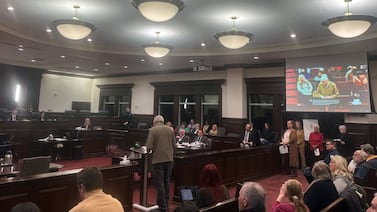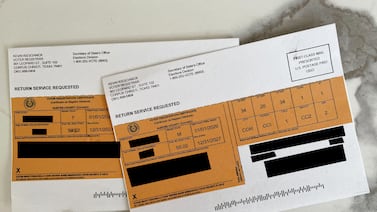How much a poll worker earns in Michigan depends less on what they do and more on where they do it.
Across the state, pay for election inspectors — the workers who check in voters and keep precincts running — can range from less than $175 a day to more than $300. That means two people doing the same job just a few miles apart might take home dramatically different paychecks.
State law only requires that election officials “receive reasonable compensation,” leaving the exact amount up to local officials. But for poll workers, where they choose to do the job is almost entirely up to them.
Votebeat surveyed more than 60 communities to see what clerks offer their poll workers. The results show wide gaps not only in pay but also in benefits, from free meals to same-day paychecks — and reveal how those differences shape the pool of workers each community can attract and keep.
Clerks told Votebeat that wide pay disparities make recruiting poll workers harder. They’re not only competing with hourly jobs that offer steady pay, but also with neighboring jurisdictions that can afford to pay more. For election officials, who have to find, train, and employ poll workers — typically referred to as “election inspectors” at the base level of training and work — the challenge repeats every season.
The grass is greener in Detroit
The pay divide is particularly stark in Wayne County, where a 20-minute drive could net a poll worker an additional $100 or more. In Detroit, poll workers start at $300 a day, compared with only $225 in neighboring Dearborn. In Livonia, a little farther west, that drops to $170 (although Lori Miller, Livonia City Clerk, recognizes the discrepancy and is working on boosting that).
Communities in smaller counties benefit from the work itself being less demanding.
Mary Hopkins, city clerk of Grand Blanc in Genesee County, said she recalled a worker choosing to go south to Oakland County. “I will say, they might have made more money, but they probably really had to earn it,” Hopkins said, “because our elections are usually relatively small and peaceful, which isn’t always true in those bigger cities.”
In Grand Blanc, a Flint suburb of 8,000 people, Hopkins starts her poll workers at $200 a day. That covers just over 14 hours of work, she said, because elections are generally small-scale. She can manage most of the prep work for the city’s two precincts, meaning election inspectors are able to show up just before polls open to be sworn in and don’t usually have to stay too late after polls close.
That rate, which works out to more than $14 an hour, is well above Michigan’s $12.48 minimum wage and enough to keep the pool of poll workers Hopkins has — which is largely made up of retirees looking to serve their community — pretty happy.
The benefits: pizza, potlucks and same-day paychecks
Often, officials told Votebeat, it’s a matter of relying on the people in your community. Poll workers are typically retirees who enjoy socializing and the pride of serving the public. In many places, the same group comes back each election cycle. Most people don’t shop around for a better pay rate, clerks said. Additional perks certainly don’t hurt, though.
The perks take different forms. In Lansing, for instance, Election Supervisor Robin Stites told Votebeat that allowing workers to serve in shifts, rather than all day, has been helpful for both recruitment and retention. Not everyone offers that option — splitting a shift means finding, training, and managing payroll for up to twice as many people — but it is working for Stites.
In Pittsfield Charter Township, near Ann Arbor, Deputy Clerk Jill Mitchell offers election inspectors boxed lunches and snacks such as granola bars or crackers.
In Burton, near Flint, election officials have ordered pizza (including veggie options for the vegetarians) and sandwiches from local restaurants, Joy Roe, deputy clerk, told Votebeat. Some precincts host their own potluck.
It works because precincts tend to be staffed by the same people each election. They know what others like — desserts, veggie trays, duck stew brought by a poll worker who is an avid hunter, Roe said — and are happy to work together to make the day more enjoyable.
“I miss it sometimes,” Roe said. “I was a poll worker for 16 years before this job, and sometimes I want to sneak out, because I know where the good food is.”
David Elwell, clerk of Blackman Charter Township in Jackson County, has won people over by ensuring that they receive their check for the work before they walk out the door. Many communities make poll workers wait several weeks for checks to be processed through the local government payroll.
“I know the workers appreciate that,” he said.
It also helps that in a number of places around the state, officials have reduced the number of precincts they run. State law has recently changed to allow jurisdictions to change the maximum size of precincts from about 3,000 people to about 5,000 people. So for the first time in years, some clerks said, they expect to have more eligible workers than they may need.
The other benefit: a chance to serve
For poll workers themselves, the benefit typically comes from supporting their community. Anything else is a bonus.
Robert Johncox, a Southfield resident who has served as a poll worker in the city for almost every election since 2018, said he’s never seriously considered leaving his own community because Southfield has a hard enough time finding people already.
“I don’t want to abandon them,” he said with a laugh.
Detroit is just across Eight Mile Road — the city and county line — from Southfield. Johncox could get a significant pay bump if he made the 20-minute drive from his house. As a precinct chairperson, the title for more senior poll workers who work closely with city clerks, he makes $275 in Southfield, compared with $230 for entry-level poll workers. Detroit, meanwhile, pays its base-level poll workers $300. Precinct chairs start at $600.
Johncox doesn’t want to drive, though. And while he certainly wouldn’t say no to free lunches, it’s ultimately the pride of serving his community that keeps him working where he lives.
“I’m retired. I had a good career as an engineer, so I’m really not doing it for the money,” he said. “I’m more there for the helping.”
Hayley Harding is a reporter for Votebeat based in Michigan. Contact Hayley at hharding@votebeat.org.


